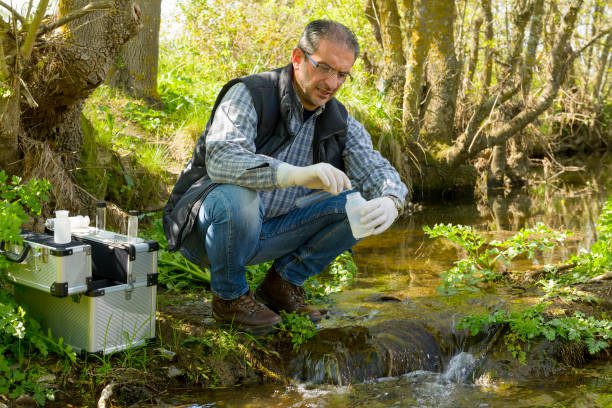
| Environmental Scientist Key Stats | |
|---|---|
| Avg. Salary / year | $66,900 |
| Avg. Pay / hour | $32.16 |
| Education | 4+ Years |
| Job Outlook | 15% |
Environmental Scientists are professionals who use their multidisciplinary knowledge in oceanography, geophysics, meteorology and information sciences to study the environment and provide solutions that protect the environment.
Their work is not only geared to improving environmental issues, it may also have a positive impact on human health.
Environmental Scientists work in different settings and may be responsible for collecting environmental data from an environment that be negatively impacted by pollution or other hazards.
In addition, these professionals may work from a laboratory setting to help determine the cause behind an area currently being negatively impacted
Table of Contents
Education Requirements to Become an Environmental Scientist
Individuals who want to become an Environmental Scientist will need a minimum of a Bachelor’s degree in order to qualify for entry level positions.
Individuals who would like to apply for advancement opportunities may seek out a graduate degree at the Master’s level.
In addition to educational requirements, individuals who want to become an Environmental Scientist will also need to focus on certain characteristics that will help them become successful in this field.
Some important characteristics to have include: problem solving, analytical, communication and interpersonal skills.
These skills will help individuals be able to write reports, analyze scientific data, present their findings and work with a variety of professionals including engineers, technicians and scientists.
Individuals entering this field can opt to study Environmental Science during their undergraduate degree, or a related field such as: Chemistry, Biology, Geosciences, Engineering or Physics.
Individuals not studying Environmental Scientist must heavily focus their studies in the natural sciences.
A PhD is not necessary to enter this field, but individuals who want to pursue a career in academia or who would like to lead basic research will need to secure a PhD degree.
However, there will be better opportunities for PhD students if they choose a focus instead of a broad Environmental Science graduate degree.
Entry level Environmental Scientists will gain on the job experience as Research Assistants, Field Analysts, or Technicians.
As they gain experience, individuals will be promoted to supervise entry level technicians or to program manager, project leader or management or research positions.
Environmental Scientist Job Description
Specific tasks vary depending on the industry an Environmental Scientist works in.
Professionals may work to rescue lands and waters that have been negatively affected by pollution or other hazards.
They may also perform research on some production practices and provide information on whether the practices are causing damage to the environment.
Finally, some Environmental Scientists may be involved in the preplanning of construction zones and provide feedback to local governments and businesses on any potential environmental impact.
Environmental Scientists may begin a project with an identified environmental problem, such as an area being affected by pollution.
The first step is to plan and develop the method for collecting information for use in investigations, projects and surveys.
After determining the data collection methods, Environmental Scientists will then collect samples of soil, water, air and a variety of other materials from a natural environment for scientific analysis.
After gathering a variety of samples from a natural environment, Environmental Scientists will then be responsible for analyzing the material, sample and surveys collected in the field.
This analysis most likely takes place in a laboratory setting and is extremely important in determining what is negatively affecting a certain environment.
Determining the cause is also important to do beforehand making any action or attempts to clean an area as the problem may not be solved without this important step.
After the thorough analyzing of samples and surveys, an Environmental Scientist will determine the best course of action to remedy any environmental issues.
These professionals are also responsible for debriefing information to the general public, government officials and businesses on hazards that are affecting local environments.
Informing these individuals on environmental hazards is extremely important because this may ultimately affect the public and create health risks for individuals.
Environmental Scientist Salary and Career Path
The annual median income for Environmental Scientists and Specialists was approximately $63,570 in 2012.
However, exact wages will depend on experience and the industry an individual is employed in.
For example, the highest earning Environmental Scientists work for the Federal Government and typically earn an annual median income of $95,460.
While State government employed individuals earn the lowest wages at $56,640 per year.
Job opportunities for Environmental Scientists are expected to grow by 15 percent through the year 2022.
This projection is considered faster than average creating more job opportunities for individuals who want to become an Environmental Scientist.
Individuals interested in environmental preservation efforts may look into this career as it offers many different benefits including good job prospects, a good income and the ability to be challenged in a variety of preservation tasks.
![]() The below information is based on the 2021 BLS national averages.
The below information is based on the 2021 BLS national averages.
National Average Salary
$81,240Average Salary by State
| State | Avg. Annual Salary |
|---|---|
| Alabama | $66,900 |
| Alaska | $86,210 |
| Arizona | $66,390 |
| Arkansas | $68,320 |
| California | $94,350 |
| Colorado | $88,990 |
| Connecticut | $84,920 |
| Delaware | $57,630 |
| District of Columbia | $123,900 |
| Florida | $61,940 |
| Georgia | $71,680 |
| Hawaii | $74,810 |
| Idaho | $73,490 |
| Illinois | $91,010 |
| Indiana | $64,150 |
| Iowa | $70,910 |
| Kansas | $70,760 |
| Kentucky | $58,870 |
| Louisiana | $78,900 |
| Maine | $66,500 |
| Maryland | $81,030 |
| Massachusetts | $95,770 |
| Michigan | $79,950 |
| Minnesota | $82,360 |
| Mississippi | $53,330 |
| Missouri | $70,310 |
| Montana | $69,450 |
| Nebraska | $65,640 |
| Nevada | $70,650 |
| New Hampshire | $81,820 |
| New Jersey | $96,060 |
| New Mexico | $79,620 |
| New York | $90,010 |
| North Carolina | $71,030 |
| North Dakota | $63,110 |
| Ohio | $75,660 |
| Oklahoma | $68,600 |
| Oregon | $82,890 |
| Pennsylvania | $74,740 |
| Rhode Island | $83,130 |
| South Carolina | $66,800 |
| South Dakota | $62,910 |
| Tennessee | $68,660 |
| Texas | $78,430 |
| Utah | $71,120 |
| Vermont | $72,300 |
| Virginia | $84,350 |
| Washington | $86,510 |
| West Virginia | $69,980 |
| Wisconsin | $74,710 |
| Wyoming | $69,610 |
| Puerto Rico | $40,890 |
| Virgin Islands | $59,970 |
The top earning state in the field is District of Columbia, where the average salary is $123,900.
These are the top 5 earning states in the field:
* Employment conditions in your area may vary.
Frequently Asked Questions
What does an environmental scientist do?
An environmental scientist can also be called an ‘environmentalist’.
In a nutshell, an environmental scientist is someone who uses his or her knowledge to protect the environment and human health.
There are quite a few different types of environmental scientists – lobbyists, researchers, computer analysts, office workers, engineers, conservationists, lab workers, inspectors, and so on.
The responsibilities of a specialist can vary, depending on the type.
However, the typical duties usually include providing scientific proof for new laws and regulations; preparing reports of environmentally hazardous accidents; assessing the potential effects of development projects; conducting scientific research; data collection (analyzing samples of water, food, soil, and other materials from the environment), etc.
How much do environmental scientists make?
On average, an environmental scientist can make a little more than $51.000 per year in the United States.
In case you decide to follow this career path, you can expect to earn anywhere between $39.000 and $77.000 annually.
The salary would certainly depend on a variety of factors – your education and experience level, the employer, the location and so on.
The environmental scientists that work in Ann Arbor, Washington DC, Columbian, and San Francisco, for example, have the highest average salaries.
An entry-level environmental scientist can earn $15.50 per hour, while a specialist with plenty of experience will make $30 and more.
How much does it cost to become an environmental scientist?
In a lot of cases, you would need a bachelor’s degree in economics, political science, psychology, environmental science or a related field, in order to become an environmental scientist.
A year in a university can cost you anywhere between $8.000 and $45.000 (and more); the cost depends on a variety of factors (the books, supplies, and accommodation expenses are not included).
You can apply for entry-level positions with a bachelor’s degree; however, to increase job prospects, you would have to go for a master’s in environmentalism, public policy, environmental planning or environmental studies (over $11.000).
Professional certifications are voluntary and vary by area of expertise.
What is the demand for environmental scientists?
Between 2012 and 2022, the environmental scientist job market is expected to grow by 15%, according to the Bureau of Labor Statistics.
That is a lot faster than the national average for all occupations in the United States (and even faster than the average for the other life, physical, and social science occupations).
Much of the growth is projected in the private sector; however, in the near future, every company will be looking for ways to decrease its impact on the environment.
How long does it take to become an environmental scientist?
It will take you 4 years to obtain a bachelor’s degree and another 2 years to earn a master’s degree.
Aspiring environmental scientists should seek seasonal and voluntary work, in order to have the opportunity to get that on-job experience; you can find an internship that lasts for one season or for a whole year.
An intern or a volunteer can be offered a full-time position in the company, so try to make the most of every opportunity.













